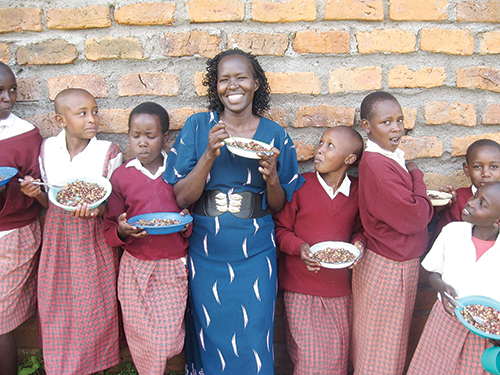
Kakenya Ntaiya is a hero.
Never heard of her? Not surprising. She’s not the kind of person you hear about, or the kind that particularly cares if you have. She’s a woman who has quietly taken the pain and suffering of her own life and turned it into hope and opportunity for others.
CNN recently told her story, and it left me speechless.
Ntaiya is from Enoosaen, a Maasai village in Kenya. In 1993, when she was 14 years old, she wasn’t worrying about pimples or whether her parents would let her have a cell phone: She was preparing for a rite of passage that every Maasai girl has faced for generations. Not a glittery quinceanera or bat-mitzvah-like like event complete with family and friends honoring your coming of age—this was very different.
There was a crowd watching, but instead of being hoisted up on somebody’s shoulders—her womanhood being celebrated—Ntaiya’s skirt was hoisted up and her womanhood taken.
She was experiencing what, according to CNN, approximately 140 million girls and women, some as young as 10 years old, have endured worldwide: female circumcision. Or, less politely, female genital mutilation. Girls’ most intimate body parts are cut out, and then they are pronounced fit to be married. Most drop out of school after the ceremony and spend the rest of their youth
bearing children, the CNN article stated.
That’s the thing—having your clitoris cut out doesn’t mean you can’t have sex or lots of kids. It just means you will never feel pleasure down there ever again. It’s how good girls stay good girls.
“It [was] really painful. I fainted,” Ntaiya said in a CNN interview. “You’re not supposed to cry.”
She didn’t, however, resist this horrible experience. Why? First, because that would have been futile; second, she knew it was her only piece of leverage to get the one thing she desperately wanted: an education. She made a bargain with her father, threatening to run away unless he let her return to high school after the mutilation ceremony.
“I really liked going to school,” she said. “I knew that once I went through the cutting I was going to be married off. And my dream of becoming a teacher was going
to end.”
When he realized how serious she was, her father reluctantly agreed. Although she paid dearly for it, she got her wish. She was an exemplary student and received a scholarship to study in the U.S.
Fast forward to today: She has a doctoral degree in education.
Ntaiya reached a place where her womanhood is no longer a bargaining chip for a different life—a place far away from a mutilation table. The amazing thing is that instead of leaving all that behind her, she returned to Kenya to make sure hundreds of other little girls can climb just as high.
In 2009, she started the first primary school for girls in Enoosaen, the Kakenya Center for Excellence, and so far 150 girls have walked through its doors. Before they do, however, their parents are required to promise that they will not put them through mutilation or force them into early marriages.
What’s special about this story are the choices Ntaiya made for herself. She started out having to make an unthinkable one so she’d have an education—something that most of us have automatic and easy access to. She could have been destroyed by it, decided that it was all too hard, that it wasn’t worth losing a piece of herself (literally). But she didn’t. She turned it into infinitely more choices that not only saved her own life but also hundreds and potentially thousands of others.
Ntaiya teaches us how un-glittery and flashy heroism really is—that really, it’s about how you choose to use your life. Often we feel like we’re defined by one choice, eternally subject to its consequences, like we’ll never be more than a single, pinnacle event in our lives.
Ntaiya defies that thinking.
She took an injustice and created justice for a village of girls. What if we saw our own choices as stepping stones to creating justice in this world? Even choices that we regret. It’s doubtful that Ntaiya saw her mutilation as anything but regrettable, but decided it wouldn’t define her future.
This was the result, in her words: “Fathers are now saying, ‘My daughter could do better than my son.’”

